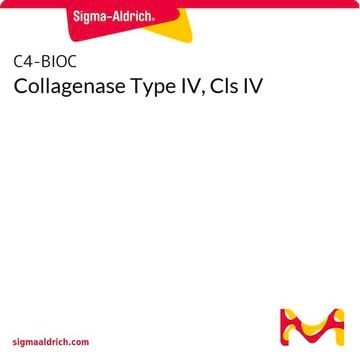C2799
Collagénase from Clostridium histolyticum
powder, suitable for cell culture, ≥4 FALGPA units/mg solid, high purity, ≥700 CDU/mg solid (CDU = collagen digestion units)
Synonyme(s) :
Clostridiopeptidase A
About This Item
Produits recommandés
Source biologique
Clostridium histolyticum
Niveau de qualité
Forme
powder
Activité spécifique
≥4 FALGPA units/mg solid
≥700 CDU/mg solid (CDU = collagen digestion units)
Poids mol.
68-130 kDa
Produit purifié par
chromatography
Technique(s)
cell culture | mammalian: suitable
pH
7.4
Activité étrangère
neutral protease and clostripain ≤1 unit/mg solid
Conditions d'expédition
dry ice
Température de stockage
−20°C
Vous recherchez des produits similaires ? Visite Guide de comparaison des produits
Application
Actions biochimiques/physiologiques
Attention
Définition de l'unité
Notes préparatoires
Produit(s) apparenté(s)
Substrat
Mention d'avertissement
Danger
Mentions de danger
Conseils de prudence
Classification des risques
Eye Irrit. 2 - Resp. Sens. 1 - Skin Irrit. 2 - STOT SE 3
Organes cibles
Respiratory system
Code de la classe de stockage
11 - Combustible Solids
Classe de danger pour l'eau (WGK)
WGK 1
Point d'éclair (°F)
Not applicable
Point d'éclair (°C)
Not applicable
Certificats d'analyse (COA)
Recherchez un Certificats d'analyse (COA) en saisissant le numéro de lot du produit. Les numéros de lot figurent sur l'étiquette du produit après les mots "Lot" ou "Batch".
Déjà en possession de ce produit ?
Retrouvez la documentation relative aux produits que vous avez récemment achetés dans la Bibliothèque de documents.
Les clients ont également consulté
Articles
Discover pre-mixed collagenase enzyme blends with DNase I, Dispase II, Elastase, and Hyaluronidase and gently dissociate animal tissues in vitro.
Discover pre-mixed collagenase enzyme blends with DNase I, Dispase II, Elastase, and Hyaluronidase and gently dissociate animal tissues in vitro.
Discover pre-mixed collagenase enzyme blends with DNase I, Dispase II, Elastase, and Hyaluronidase and gently dissociate animal tissues in vitro.
Discover pre-mixed collagenase enzyme blends with DNase I, Dispase II, Elastase, and Hyaluronidase and gently dissociate animal tissues in vitro.
Protocoles
To measure collagenase activity, N-(3-[2-Furyl]acryloyl)-Leu-Gly-Pro-Ala is used in a continuous spectrophotometric rate determination at 345 nm. Collagenase hydrolyzes collagen peptide bonds.
To measure collagenase activity, N-(3-[2-Furyl]acryloyl)-Leu-Gly-Pro-Ala is used in a continuous spectrophotometric rate determination at 345 nm. Collagenase hydrolyzes collagen peptide bonds.
To measure collagenase activity, N-(3-[2-Furyl]acryloyl)-Leu-Gly-Pro-Ala is used in a continuous spectrophotometric rate determination at 345 nm. Collagenase hydrolyzes collagen peptide bonds.
To measure collagenase activity, N-(3-[2-Furyl]acryloyl)-Leu-Gly-Pro-Ala is used in a continuous spectrophotometric rate determination at 345 nm. Collagenase hydrolyzes collagen peptide bonds.
Notre équipe de scientifiques dispose d'une expérience dans tous les secteurs de la recherche, notamment en sciences de la vie, science des matériaux, synthèse chimique, chromatographie, analyse et dans de nombreux autres domaines..
Contacter notre Service technique






